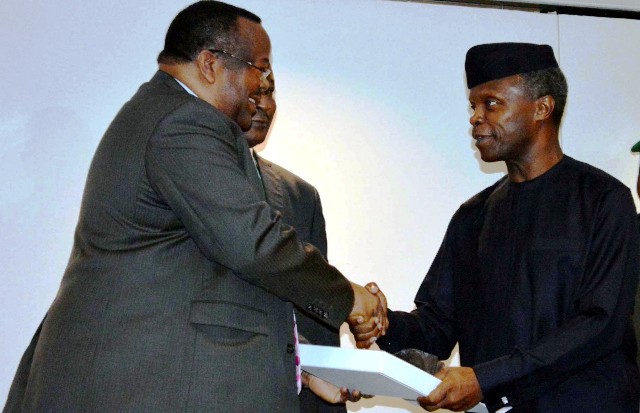Business
RMAFC To Recover N56.6bn From Five States, MDAs

The Revenue Mobilisation, Allocation and Fiscal Commission (RMAFC) says it will recover an additional N56.6 billion from five states and federal Ministries, Departments and Agencies (MDAs) in the ongoing tax liabilities recovery.
The Acting Chairman, Mr Shettimma Abba-Gana, made the remark in an interview with newsmen in Abuja, Wednesday.
He said the exercise covered between 2005 and 2015 across 30 states of the federation.
He said that the exercise, being carried out by the commission, had already uncovered N115 billion.
Abba-Gana said that monitoring and auditing were an ongoing exercise meant to discover and recover funds, collected and meant for the federation account.
“We always go back to monitor and audit and check if the right tax collected has been remitted.
“So, we find new taxes that have not been remitted or collected, and it’s good that we are doing this, and are finding uncollected and unremitted revenue.
“The exercise also has another benefit because it will serve as a deterrent to the agencies, tax payers or tax collectors, to be aware that sooner or later RMAFC will come.
“So, they might as well make sure they have got their books in order.’’
He added that the exercise was expected to bring about an increase in revenue collection and remittance.
Abba-Gana said there were sanctions for delays in the remittance of the revenues, but that they would only be applied where it was established that those delays were made on purpose.
“It is not going to be fair to say that some of these things are deliberate.
“They may be, but we have to give benefit of the doubt whether something was forgotten or maybe bureaucracy or wrongful applications or some mistakes have been made.
“They could be acts of deliberate attempts to evade or avoid paying the revenues, but it is always better to say there could be mistakes, forgetfulness or misapplication of the rates and things like that.
“So, when issues of deliberate attempts to not remit are found, definitely some agencies like the Economic and Financial Crimes Commission (EFCC) would have to be brought in, and sanctions would follow from there.
“There is a charge for delayed remittances but when a major problem is found, the EFCC will have to be brought in.’’
He also spoke about verification and reconciliation of revenue collections and remittances from collecting banks, on behalf of the Federal Inland Revenue Service (FIRS) and the Nigeria Customs Service (NCS).
Abba-Gana said that N6.4 billion was recovered between January 2008 and June 30, 2012, while the second phase that covered July 31, 2012 to December 31, 2015 recovered N40 billion.
He, however, said that an uncontested N7.9 billion had been established from the concluded reconciliations with the banks.
The RMAFC was established to monitor accruals into the federation account and the disbursement of revenue from it.
Business
USTR Criticises Nigeria’s Import Ban On Agriculture, Others
The United States Trade Representative (USTR) has criticised Nigeria’s import ban on 25 categories of goods, claiming that the restrictions limit market access for American exporters.
This is the effect of President Donald Trump’s tariffs introduction on goods entering the United States, with Nigeria facing a 14 per cent duty.
The USTR highlighted the impact of Nigeria’s import ban on various sectors, particularly agriculture, pharmaceuticals, beverages, and consumer goods.
The restrictions affect items such as beef, pork, poultry, fruit juices, medicaments, and alcoholic beverages, which the United States sees as significant barriers to trade.
The agency argues that these limitations reduce export opportunities for United States businesses and lead to lost revenue.
“Nigeria’s import ban on 25 different product categories impacts United States exporters, particularly in agriculture, pharmaceuticals, beverages, and consumer goods.
“Restrictions on items like beef, pork, poultry, fruit juices, medicaments, and spirits limit United States market access and reduce export opportunities.
“These policies create significant trade barriers that lead to lost revenue for United States businesses looking to expand in the Nigerian market”, the agency said .
In 2016, Nigeria implemented the ban on these 25 items as part of efforts to control imports and stimulate local production.
Some of the banned items include poultry, pork, refined vegetable oil, sugar, cocoa products, spaghetti, beer, and certain medicines.
On March 26, 2025, the Federal Government also announced plans to halt solar panel imports to encourage local manufacturing as part of its push for clean energy.
Business
Expert Seeks Cooperative-Driven Investments In Agriculture
A leading agribusiness strategist and digital agriculture expert, Ayo Oluwa Okediji, has sought cooperative-driven investments in sustaining growth of poultry industry in Nigeria.
He said the poultry industry was at a defining moment and requires urgent structural reforms to secure its future and ensure long-term sustainability.
Speaking on the theme, “Strengthening Poultry Farming Through Cooperative Synergy and Strategic Investments”, at the recently concluded Oyo Mega Poultry Workshop 2025 in Ibadan, Okediji called on poultry farmers, cooperative leaders, financial institutions and policy makers to rethink the existing structure of the poultry sector.
He stressed the need to transition from fragmented, individually-driven operations to well-structured, cooperative-led enterprises capable of attracting sustainable financing and securing long-term viability.
He said, “Our poultry sector cannot thrive on individual effort alone. We need to organise ourselves into cooperative clusters, build strong governance systems and position ourselves to attract the level of investment needed to sustain this industry beyond this generation.”
Drawing on lessons from successful global cooperative models such as Rabobank in the Netherlands and Landus Cooperative in the United States, Okediji introduced the FarmClusters Poultry Model, a locally adapted solution developed by Agribusiness Dynamics Technology Limited (AgDyna), a subsidiary of AgroInfoTech Africa.
According to him, the model is currently being piloted in Oyo State in partnership with PANOY Agribusiness Limited and local poultry cooperatives.
Business
NACCIMA Proposes Hybrid Oil Palm Seedlings For Farmers
The Rivers State Representative of the Nigeria Chambers of Commerce, Mines, Industries and Agriculture (NACCIMA), Mr. Erasmus Chukwundah, has urged palm oil farmers to consider hybrid seedlings for planting, if they must break even in palm oil business.
Chukwundah said this recently at the Free Oil Palm Business Climate Smart Best Management Practice/Assistance Training organized by Partnership Initiative In Niger Delta (PIND) for Palm Oil Farmers in Elele, Ikwerre Local Government Area.
The Rivers representative said until palm oil farmers begin to consider such hybrid oil palm seedlings, they may not meet up with the daily increasing demand of palm oil in the market.
According to him, the seedlings produce up to 30 bunches at once that ripen same time.
He said PIND decided to partner with Oil Palm Growers Association of Nigeria (OPGAN) to ensure that the message was received by the targeted audience.
According to him, palm oil remained a popular choice of industry operators as it could be converted to many other products such as vegetable cooking oil.
He also noted that products such as motor tyers, marine ropes and others are now gotten from the palm tree.
Chukwundah, who is the immediate past Director-General of Port Harcourt Chamber of Commerce, Mines, Industries, and Agriculture (PHCCIMA), further warned against use of unrecommended fertilisers in growing oil palms.
He noted that such practices could limit its export value or chances as the foreign marketers have a way of detecting such .
He reiterated the need for organic fertilizers, including poultry droppings, to enable them have a natural palm oil.
“People must reduce physical contact with palm oil production. That is why we are campaigning for hydrolic oil mills. The foreign markets are no longer interested in crude method of palm oil production”, he said.
Meanwhile, one of the farmers, Sonny Didia, who appreciated Chukwundah’s commitment towards the concern of farmers, appealed for an urgent need for loan opportunity with low interest rate in order to enable them beat the target.
King Onunwor
-

 News5 days ago
News5 days agoCouncil Boss Sues For Love, Unity
-
Editorial17 hours ago
Reforming Nigeria’s Prison Crises
-
Politics16 hours ago
Leave PDP, Bode George Tells Atiku, Wike
-

 News5 days ago
News5 days agoIBAS, FAMILY CELEBRATE EASTER AT GOVERNMENT HOUSE CHAPEL
-

 Politics5 days ago
Politics5 days agoEkiti YPP Felicitates Christian Faithful At Easter
-
News16 hours ago
Nigeria Safe For Investment, Edun Assures Investors
-

 Featured15 hours ago
Featured15 hours agoFG Begins Induction For New Permanent Secretaries, Accountant-General
-

 News5 days ago
News5 days agoUS Supreme Court stops Trump from deporting migrants

